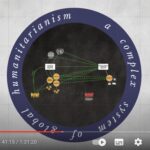Mitigating Landslides
In 2012, the Central and Western provinces of Sri Lanka experienced a sequence of landslides that caused many deaths and property destruction. In the wake of this “natural disaster”, the National Building Research Organisation (NBRO) attempted to identify disaster prone areas in the country, and then mitigate such areas. I use quotation marks around the words natural disaster because the disaster was a result of a combination of torrential rains as well as human interventions in hilly areas that rendered such areas vulnerable to landslides.
In this response paper, I focus on one such site in a town called Peradeniya that experienced severe damage in the wake of heavy rains (first picture). Shops underneath were crushed by the boulders and the soil from the eroded hill. The NBRO took steps to mitigate the situation by covering the area with metal nets and plastic sheets, before eventually planting grass (second picture). As the article, “Seventy landslide-prone areas identified” in the Sunday Observer states, the mitigation attempt proved to be successful.
Meanwhile, a nearby site that was equally threatening and had “houses, shops and boutiques close to the location” was targeted for mitigation by the NBRO. People owning shops and living in the area refused to move despite the NBRO’s declaring the area as a hazardous zone. And so, “the NBRO [was] unable to start mitigation work until such time” (Naalir 2012). Here, even though powerful national structures were collaborating with experts on landslide mitigation to execute a project, a handful of people who habituated these areas prevented the project from taking place.
Further discussion of this situation would benefit from the theoretical lens of “Actor Network Theory” (ANT) that Jonathan Murdoch (1996) outlines in his article, “Inhuman/nonhuman/human: actor-network theory and the prospects for a non-dualistic and symmetrical perspective on nature and society”.
http://archives.sundayobserver.lk/2012/11/18/fea08.asp
Contributed by KumeriBandara on 17/02/2020





